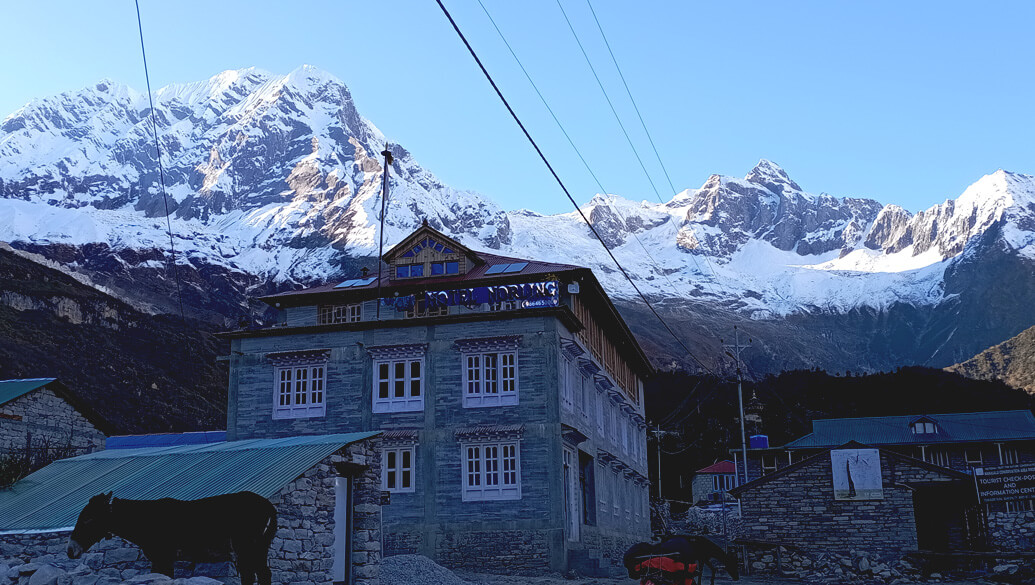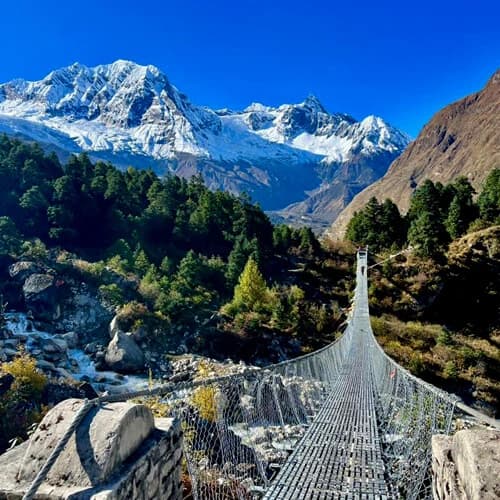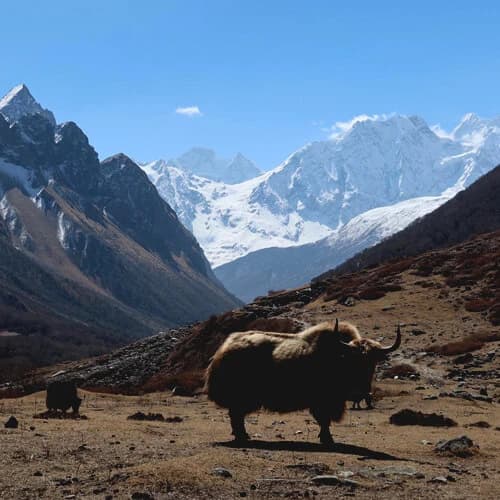Food on the Manaslu Trek
The Manaslu trekking trail is dotted with a number of locally owned lodges and tea houses that provide food and accommodate the trekkers. The teahouse of Manaslu offers a wide range of food products, even though you might not find everything you're craving. While the number of people hiking the Manaslu Circuit and Tsum Valley rises every year, the Manslu tea houses are becoming better and better every day with more food items on their menu. Altitude also plays a crucial role in the availability of food items. While teahouse menus on the lower altitude include a larger selection of food, those in the upper elevations tend to have limited items due to a lack of supply.
Food options in the Manaslu tea shops include both vegetarian and non-vegetarian options. It is not recommended that you consume non-vegetarian food when trekking, as eating meat at higher elevations might strain your metabolism and cause digestive issues. Similarly, frozen food takes a long time to reach the tea houses making them unhygienic so it's best to avoid those. It’s not a good idea to get sick in between the hikes. So, stick to locally sourced vegetarian food as much as possible.
You'll typically have breakfast, lunch, and dinner three times a day when trekking the Manaslu Circuit. It's always a good idea to pack some snacks for on-the-go energy boosts.
Breakfast
Breakfasts are usually provided in the lodge or teahouse where we stay overnight. Since we begin the trek early in order to avoid the mid-day sun, breakfast is also served early in the morning from 6 am to 8 am. The ultimate pleasure that comes from eating a warm, filling breakfast while watching the mountains in the golden hue cast by the rising sun is just unbelievable.
Breakfast can cost you anywhere between $3 to $8 depending on the portion and altitude.
You’ll find various breakfast options depending on the altitude you’re in. Here are some of them:
Tibetan Bread: The traditional Tibetan bread is the most well-liked breakfast choice while trekking in the Himalayas. It is served with peanut butter, jam, or honey. You can also add cheese and eggs to it.
Breakfast Set: The breakfast set includes bread toast, chapati, or Tibetan bread with hash brown potatoes, a choice of egg (boiled or omelet), and a hot beverage (tea or coffee).
Pancakes: You’ll get various types of pancakes (plain, chocolate, banana) with peanut butter or honey on them.
Cereals: If you'd rather have something light for breakfast, try some porridge, muesli, or cornflakes with milk or yogurt and fruit.
Paratha: Paratha is a flatbread from India with a filling of either potato or egg, usually served as breakfast.
If you like to have something plain and simple you can also go for french toast, vegetable soup or just eggs.
Lunch and Dinner
After a few hours of hike, lunch is served in a tea shop along the trail. You’ll be having your lunch at around 11 am to 1 pm depending on the length of the day hike and the availability of tea shops on the particular section of the trail. You’ll mostly have an hour or two of lunch break where you can rest for a while when the food is being prepared.
Dinner, again, is provided in the overnight teahouse or lodge at the end of the day. The usual dinner time in the Manaslu is from 7 pm to 9 pm. Since it’s cold in the evening, dinner is served in the dining hall heated with a firewood stove in the middle.
Since the day hike usually concludes at around 3 or 4 in the evening, you can go for a light snack as there’ll be still a few hours left until dinner. You can eat whatever you’ve packed or ask the teahouse staff to fix you a quick dish like instant noodles.
Depending on the altitude and availability, you can buy a lunch or dinner for $4 to $10.
Here’s a list of lunch and dinner items available in the tea shops of the Manaslu Trek:
Dal Bhat: Dal Bhat is the most popular lunch and dinner menu in the trekking trails of the Nepalese Himalayas. Dal is a lentil or pulse soup and bhat is white rice, served with sides of seasonal vegetables, pickles, and salad. It is available in both vegetarian and non-vegetarian options; the non-veg option contains a side of chicken or mutton curry.
Momo: Momo is another famous Nepalese dish which is basically a steamed dumpling available in both vegetarian and non-vegetarian options.
Chowmein or Noodles: Chowmein is a special Nepalese noodle that you can get in the tea houses of the trail. You can also enjoy various instant noodles that are light, simple, and quick to prepare.
Thukpa or Thenthuk: It is a vegetable/non-vegetable noodle soup that you can have for lunch or dinner. It's served warm and hot, making it a great meal for cold temperatures.
Potato dishes: Potatoes being the most popular vegetable of the region, the route offers a wide variety of foods made with potatoes like fried potatoes, finger chips, mashed potatoes, chips chilly, boiled potatoes, etc.
Rice with curry: If you’re not a fan of the full-course dal bhat, you can also opt for rice with simple vegetable or meat curry.
Fried rice: Fried rice is another popular dish in Nepal where white rice is cooked with a variety of vegetables, eggs, or meat.
Pasta or Spaghetti: You can also enjoy pasta and spaghetti served with vegetables, meat, or eggs and seasoned with tomato sauce at the lower regions of the trek.
Pizza: Pizza of all kinds is available for lunch and also for dinner in the restaurants of the lower elevations. However, they might not be of the best quality.
These are the most common food items available on the Manaslu trail. However, you might not get all the options in the higher altitudes and get even more in the lower altitudes. The availability of food items also depends on the time you’re trekking in. You won’t find many options during the off-season due to the smaller number of visitors.
Drinks on the Manaslu Trek
Staying hydrated is essential for a successful trek, and this is particularly true in the high-altitude Manaslu region. Hence, the trail offers various kinds of drinks both prepared locally and brought in from the nearby towns to keep your water level in check. Let’s get to know more about the drink items available in the tea shops along the Manaslu trekking trail.
Drinking Water
Among all, water is the most essential drink one should be consuming on a trek. We advise you to consume 4 liters of water or more each day. Water helps you to combat altitude sickness by keeping your body hydrated.
Considering the location, you won’t have a drinking water supply on the trails. Locals rely on natural sources of water like springs and rivers, which aren’t safe for tourists to consume directly. So, the tea houses boil the water and serve it to their customers. While the boiled water is offered for free at the tea house where you stay, you’ll have to pay a minimal cost of $1 or $2 for a liter of boiled water at the tea shops along the trail. If you’re still skeptical about the safety of boiled water, you can add a purifying liquid or tablets to further purify it. The best option is to carry a water bottle with an in-built filtration system and filter the water from natural sources along the way to make it drinkable.
You’ll also get to buy bottled water for $1 to $2 but due to the increasing plastic waste on the trail, we strongly advise against the use of single-use plastic bottles.
Hot Drinks
Hot drinks like tea and coffee are abundantly available on the Manaslu trek. For generations, hikers in the Himalayas have treasured the company of tea and coffee. Drinking tea and coffee at the end of a tiring day becomes a soothing ritual as it gives warmth to the frigid mountain air. Moderate amounts of tea and coffee supply your body with the caffeine it needs to stay energized throughout the hike. You can go for milk or black coffee, Tibetan tea, milk tea, black tea, mint tea, ginger tea, lemon tea, or green tea. Apart from tea and coffee, hikers also love to sip some hot lemon with ginger and honey, and garlic soup, which are great for altitude sickness.
The cost of a hot drink ranges from $2 to $5 depending on what you’re drinking and the altitude you're in.
Soft Drinks
Soft drinks like Coca-Cola, Fanta, Sprite, Pepsi, canned juice, energy drinks, etc. are easily available on the trail. You can indulge in moderate consumption of such cold drinks to quench your thirst. However, soft drinks contain caffeine and too much caffeine consumption can dehydrate you, which worsens altitude sickness.
Alcoholic Beverages
Manaslu region offers a wide range of alcoholic beverages that are locally produced and have unique flavors and cultural value. Local raksi and some internationally renowned beer, whiskey, rum, and vodka are readily available. Even while it's tempting to indulge in these delicacies, you should avoid doing so too often, particularly when you're at a high altitude. Alcohol dehydrates your body and the risk of altitude sickness is particularly greater when your body is dehydrated.
Accommodation on the Manaslu Trek
The Manaslu region used to be a camping trek location a few years back. But now, the situation is changing for good. You’ll find plenty of comfortable accommodation options like lodges and tea houses on the trail that are catered to fulfill the needs of the trekkers. Since Manaslu is a less popular trekking destination, lodging won't be a problem for you while you're there.
The cost of accommodation varies depending on the hiking season and the altitude reached on the journey. Lower altitude lodging costs $3 to $5 USD during peak season. But accommodation costs increase as you proceed, to roughly $7 to $10 USD in higher altitudes. In the off-season, lodging at lower elevations costs $2 to $3 USD. However, as you move higher, the cost increases to roughly $5 to $7 USD.
Tea Houses
The most common type of lodging on the path is a teahouse, which is typically found in a village or along the main hiking routes. A tea house is owned by a local and is basically a house with simple rooms dedicated for trekkers to spend the night. These tea houses come in a variety of styles, from budget-friendly models with minimal comforts to more luxurious models with amenities like Wi-Fi and hot showers.
Lodges
Compared to teahouses, lodges are cozier and larger, although they are typically more costly. Western cuisine is frequently served at lodges, along with hot showers and private restrooms. They are usually found in bigger villages or towns, and they could have extra features like internet access and laundry facilities.
Some adventure seekers who want a traditional camping experience can even tent their way through the Manaslu trip. Since camping might be more difficult than tea house trekking, you will need porters to help you carry the essential supplies.
What to expect in a Manaslu lodge or a tea house?
The lodges and tea houses on the Manaslu Trek are made up of thick stone walls and have small rooms consisting of basic furnishing. You’ll be using shared restrooms for the majority of the trek. In addition to cozy rooms, the tea houses also have a communal dining space and a kitchen where the food is prepared.

Rooms
The rooms are available on a twin-sharing basis and usually consist of two individual beds, mattresses, warm blankets, bedsheets, pillows, and pillow covers. You can carry your own sleeping bag for extra warmth and a pillow cover for hygiene. The sheets aren’t changed after every use as it is impossible to hand wash and sun dry them daily in the cold weather of high altitudes.
Restrooms
While you might have access to private bathrooms with western toilets and running water in the lower altitudes of the trek, you’ll have to use a shared restroom with Asian-style squat toilets in the higher altitudes. You might not always get running water but you’ll be provided with water in a container. Toilet paper and other toiletries are also subject to availability so it’s best to carry your own toiletries for hygiene reasons. You can get hot showers for $2 or $3, but taking a bath frequently is not a good idea in such cold weather.
Dining Area
Almost all lodges and tea houses have a communal dining space where the trekkers gather in the evening and talk about their day. The dining space contains a fireplace in the middle used for heating the room and boiling water. It’s a lively experience to gather around the fireplace after a long tiring day and share some laughter. The dining area is also equipped with tables and chairs or benches to sit and eat food.
Power Supply
While lower regions have access to hydropower, the upper parts use energy generated from solar power. The rooms, kitchen, and dining area are lit using solar power. Although the rooms lack charging plugs, the communal space will have a charging station where you can charge your phones, camera batteries, power banks, torchlight, and other electronics. Remember to be mindful while using the charging station as it has to accommodate the devices of all the trekkers staying in that particular teahouse.
Internet Access
Some lodges, especially in the lower elevations provide free WiFi service for their customers but we cannot completely rely on it. The WiFi coverage is usually spotty and weak. So, it’s best to use mobile data wherever there’s network coverage available. You can buy either an NTC or Ncell SIM card in Kathmandu before leaving for the trek.
List of accommodation facilities on the Manaslu Circuit Trail
We have selected some of the top accommodation facilities along the Manaslu trekking trail to make things easier for you. Here’s a list of some of the popular and trusted lodges and tea houses in different locations of the Manaslu Circuit.
Soti Khola
- Budi Gandaki Guest House
- Satkar Guest House
- Fulbari Guest House
- Hotel ABC
- Hotel Tsum Valley
- Green Valley Guest House
Machha Khola
- Everest Guest House
- Tsum Valley Guest House and Lodge
- Hilltop Guest House
- Hotel Heaven Guest House
- Larkey Guest House
Jagat
- Rubi Nala Guest House
- Jagat Guest House
- Himalayan Tourist Guest House
- Manaslu Santi Guest House
Deng
- Shangrila Cottage
- New Manaslu Guest House
- Windy Valley Guest House
Namrung
- Namrung Guest House
- Nubri 4 Season Resort
- Namrung Cottage
- Namrung Thakali Guest House
Lho
- Manaslu View Guest House
- Lama Guest House
- Hotel Majestic Manaslu
- Sonam Lodge
- Tashi Dalek Guest House
- Namaste Guest House
Sama Gaun
- Norling Guest House
- Gurung Cottage Guest House
- Mount Manaslu Guest House
- Nobri Valley Guest House
- Tashi Dalek Guest House
- Peace Heaven Guest House
- Sama Gaun Guest House
Samdo
- Jambala Guest House
- Yak Hotel
- Tibetan Twin Hotel
Dharamshala
- Larkey Bazzar Guest House
- Larkey Guest House
- Larkey Phedi Lodge
- Jambala Guest House
Bhimthang
- Himalayan Guest House
- Tibetan Guest House
- Sushma Guest House and Lodge
- Apple Garden Lodge
- Mountain Poker Cottage and Lodge
- Ganga Manaslu Lodge
Dharampani
- Tashi Delek Lodge
- New Tibet Guest House
- Gorkha Inn
In conclusion, enough food and adequate lodging facilities are available in the Manaslu trekking trails. But don't anticipate staying in luxury accommodations like that of the Everest and Annapurna regions. One can comfortably finish the hike with the range of food options and lodging areas that are provided. Make sure you are adequately heated and hydrated during the night. Eat well, drink plenty of water, and avoid getting sick.
If you need more information about trekking in the Manaslu region, don’t hesitate to reach out to us via mail (info@outfitternepal.com) or Whatsapp (+977 9851137385). We’ll try our best to help you. Happy Trekking!
Some Most Popular Treks





